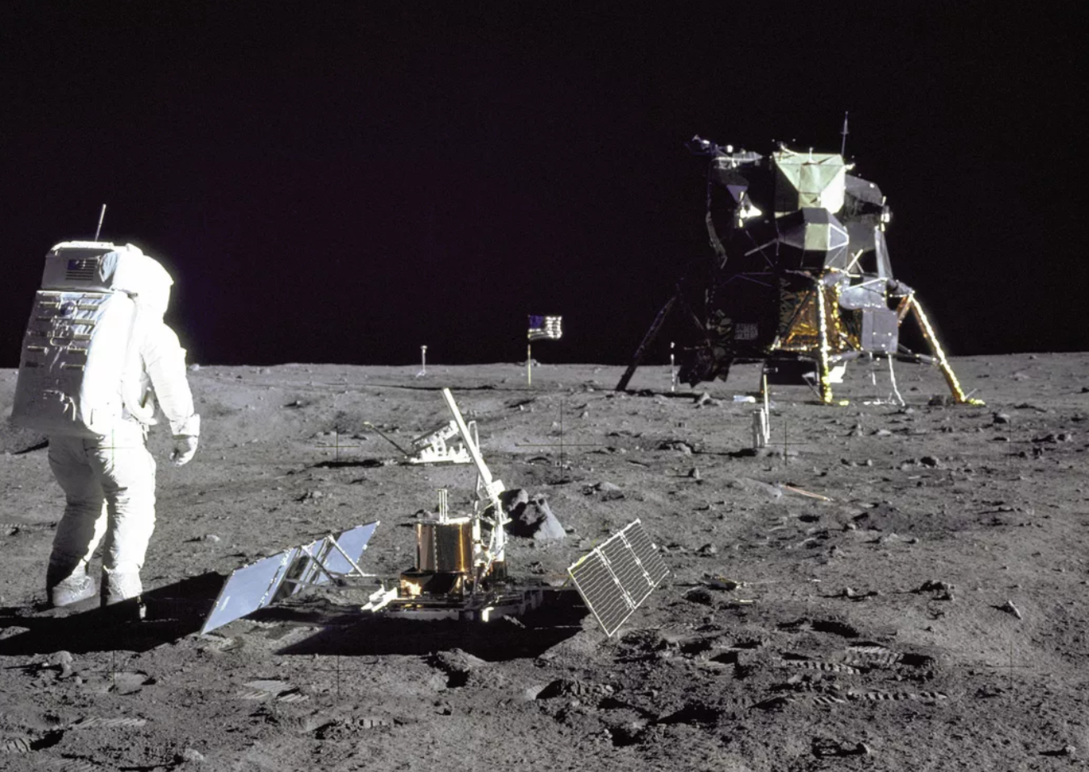July 20, 1969: “I’m Going to the Moon, Too. Dad, Will You Come with Me?”
July 20, 1969. Blue eyes on the screen. Small eyes and big eyes, drowsy, but forcibly kept open. Sitting on the family’s sofa, a father and daughter are surrounded by the silence of the town. This was a vacation night unlike any other.
Everyone in the apartment is sleeping. The pendulum on the wall marks the minutes, every half hour or so the church’s bells accompany it but they are not all in sync. The bells were still not able to chime simultaneously and yet man was about to make history. At least at that time. There was no Internet, there weren’t CDs, Apple hadn’t invented anything yet, and there weren’t even cell phones.
The little girl who was not yet eight years old had not yet turned 8 thought about the images from her school books, the pictures of the moon in different phases, sketches but also scientific research. She was filled with the desire to know and the dream to experience it with her father. “I’m going to the moon, too. Dad, will you come with me?” Happy to know how to read, she tried to capture the subtitles on television.
Nestled close to her father, she wanted to understand, but she could ask very little. The pact was to remain standing, being careful not to wake her little sister, mom, grandparents.
The black and white TV images sent from the United States take her to the moon. The moon is so far away but not much further than America in the mind of that child – the America of her grandfathers’ friends who returned to the town on vacation with green cards. Grandfather Salvatore looked at them with dreamy eyes, proud. His friends had made it!
How far away America was! And if the Americans managed to get to the moon, they were at least as far away as the inhabitants of the earth’s satellite. At least, that’s what the little girl thought.
But were there really men on the moon? There had to be for sure. Perhaps they were hidden in those holes, for which she had recently learned the correct term: craters.
Beside her was her father, about thirty-five years old. There was hope for the future in the air, hope that was so palpable in the ‘60s. He had just bought a new house in Rome, he was succeeding in his career. The return each year to the town of his birth was nearly triumphal for him.
He was the son of a laborer who was able to study and who had “made it.” He no longer suffered that hunger that so many remembered indeed! Yes, even for him, everything seemed possible, conquerable with hard work. Even the moon.
And finally her heart jumps into her throat, but for only a second.... “It has landed,” says the reporter Tito Stagno. From the U.S., his colleague Ruggero Orlando responds, “It has not landed.” Shortly after, it’s confirmed.
The Lem, that strange mechanical animal with feet, is really on lunar soil. Along with two other reporters, the bigwig Italian journalist, Andrea Barbato, provides commentary. But the little girl does not know this at the time.
Those sleepy eyes awaken, in search of images. The first images arrive upside down, but only of the moon. Perhaps the moon is upside down? Instinctively, she turns her head upside down.
It will be a long night for the father and child, a night full of thoughts, comments, and emotions, and so many dreams.
All this unfolds until the moment in which Armstrong places the first human foot on the moon. He utters that historic phrase that makes us reflect: “It’s one small step for man, one giant leap for mankind.”
It’s a sentiment that is still moving today but it does so in a way that they would have never imagined back then – both the father who is no longer here and that little girl who remembers him more than the moon.









































i-Italy
Facebook
Google+
This work may not be reproduced, in whole or in part, without prior written permission.
Questo lavoro non può essere riprodotto, in tutto o in parte, senza permesso scritto.